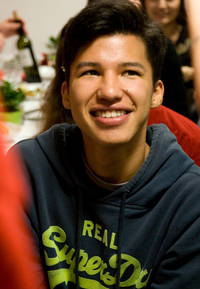

PAUL GEERLIGS
Country: The Netherlands
Programme: Academy Year (2012)
Email: p.geerligs@ecla.de
Why did you choose ECLA?
I was a bit confused on what and where I should study, so my art history instructor recommended I look into ECLA. I viewed the website, and since she gave me her recommendation, I decided it was interesting enough to apply.
What was the most interesting course for you so far and why?
During my first term I took the elective on Nineteenth-Century German and French art. The course was fantastic. The required readings really prepared me for discussion in the seminars, and we often did this over tea and biscuits. We were required to do weekly museum visits, and this had the added benefit of having a reason to go into the city.
What's the most important thing you've learned at ECLA?
Since arriving at ECLA, I think the most important thing that I've learnt is writing ability. I can now write papers faster and with more substance. The tutorial system truly works-instead of just reading content feedback, in tutorial we discuss arguments and claims made, and the respective strengths and weaknesses, the content and wording of the paper itself, and generally, how the paper can be improved.
What's your favourite activity outside the classroom?
I really enjoy the café life, so whenever I have free time, I go into the city and find somewhere to relax, read, and drink cappuccinos (because I'm unable to stop at just one)! My favourite department store in all of Europe, KaDeWe, just happens to be conveniently located in Berlin, and I spend much time there stocking up on Nespresso capsules.
When/if a friend comes to Berlin, where do/would you take them?
My friend came to visit me this weekend, so I took him to an indie music club near Warschauer Straße and the following day to the typical tourist sights such as Brandenburger Tor. We then had lunch at Potsdamer Platz, and then proceeded to the Staatsbibliothek at Potsdamer Straße.
In your view, what is the value of a liberal arts education?
I think a liberal arts education is important because it is not very career specific. It may sound paradoxical, but the skills learnt such as critical thinking are quite important-instead of viewing problems in one mind set, a liberal arts education forces us to view a situation from all possible angles. Furthermore, because the curriculum is broad, one can explore topics not otherwise possible if studying something narrower. As a result, instead of being readily employable in a specific trade, a liberal arts education prepares one for many different professions. However, the best thing about a liberal arts education is that it is absolutely enjoyable!
